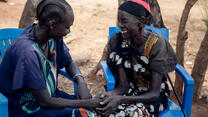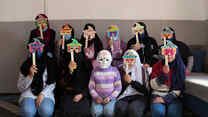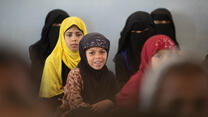Digital technology brings great potential to bridge service gaps in humanitarian settings. However, by implementing digital solutions without addressing the digital gender gap, we risk not only leaving behind women and girls but also re-entrenching harmful, patriarchal norms unintentionally. To truly harness the power of digital technology in an equitable manner, this requires acknowledging and addressing the unique barriers women and girls face in meaningfully accessing technology.
In 2017 and 2019, in Lebanon and Uganda respectively, IRC conducted research to better understand the digital gender gap in humanitarian settings. This research revealed gendered barriers to quality access to technology for women and girls. The barriers included prohibitive cost, restrictions from public space (where women and girls may have increased their exposure to technology), lack of technical confidence (related to lack of exposure and hampered desire for access), and most notably, harmful attitudes and behaviors toward women and girls’ use of phones and the internet.
Of these barriers, social disapproval is the common thread, unique to women and girls, that impedes equitable access. Disapproval within familial and social networks, as well as apprehension of broader community censure, contribute to the limitations placed on women and girls' technological access, participation, and empowerment. These limitations are further compounded by the pervasive fear of online harassment, which acts as a significant barrier to digital inclusion.
Yet, the offering of services in digital spaces is unlikely to recede.
Informed by research and user-centered design, IRC developed a gender-sensitive and safety-prioritizing digital literacy curriculum for women and girls. This curriculum covers: 1) an introduction to digital spaces, 2) digital accounts and apps, 3) finding information online, 4) staying safe online, 5) social media, and 6) digital employment and education skills. It was designed to be implemented in Women and Girls Safe Spaces. These are physical spaces in humanitarian settings where women and adolescent girls can be free from harm and harassment. Places where women and adolescent girls can gain knowledge and skills; access gender-based violence response services or other available services; and foster opportunities for mutual support and collective action in their community.
IRC’s Safe Space to Learn Digital Literacy Curriculum was piloted with 50 women in the Abyan governorate of Yemen with funding from Fujitsu. The program demonstrably enhanced participants' skills in crucial digital citizenship areas, including online navigation, secure account management, and proactive online safety strategies. This translated into tangible benefits, with participants highlighting improved access to information and opportunities, including resume writing, new job platforms, and online skill development programs.
Participants reported an increase in their digital self-efficacy, evidenced by heightened confidence in online engagement. They described feeling empowered and in control of their online experiences, citing their ability to navigate the internet with assurance and manage potential online challenges effectively.
Because of the program’s gender-sensitive content and its deployment in the Women and Girls Safe Spaces, it fostered a supportive community amongst participants, promoting cooperation and knowledge sharing. This collaborative spirit extended beyond the program, as evidenced by participants assisting family and friends with their digital navigation.
The curriculum is freely available to other organizations thanks to a Creative Commons license, and it has been translated into several languages, including Arabic, Burmese, English, French, and Spanish.
IRC is planning to enhance the curriculum by adding new modules, and is developing an online version in partnership with UNICEF.



